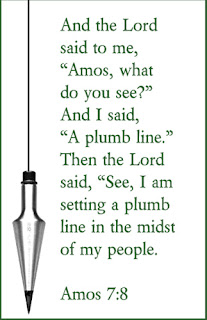As you probably know, a pendulum is a weight that swings back and forth from a fixed point. Unfortunately, the pendulum symbolizes the way we’ve treated the gift of sex—going from one non-biblical extreme to another.
As I’ve mentioned before, religion has an unfortunate history of treating sex as something dirty and shameful. Even now, those of us who advocate purity must carefully guard against legalism.
Then there’s the other extreme—a “liberated” mentality in which anything goes and all modesty is lost. When society allows the pendulum to swing in this direction, the results are incredibly destructive.
I don’t want to be like a pendulum. I don’t want to react (and overreact) to the problems I see around me. There’s another way, and another symbol: the plumb line.
A plumb line is a pointed weight on the end of a string. This tool produces a straight line every time—gravity ensures it. The Lord Himself used the plumb line as a symbol of His perfect, unchanging standards.
When it comes to sex, God’s “plumb line” runs consistently through the Bible. It begins in Genesis 2:24, where He describes the beautiful, mysterious “one flesh” union between husband and wife. Jesus quoted this very passage when teaching about marital fidelity (Matthew 19:5). Paul quoted it in making his case against sexual promiscuity (1 Corinthians 6:16). God designed sex to be experienced only within marriage–His mind hasn’t changed.
I pray that we will act as plumb lines, not pendulums. Let’s continue to present God’s standard: no more, no less.


